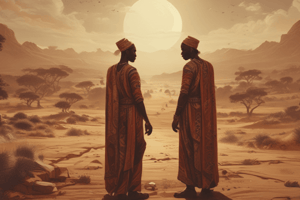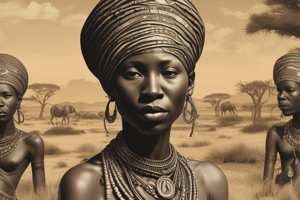Podcast
Questions and Answers
What role do beliefs and social relations play in African ethics?
What role do beliefs and social relations play in African ethics?
They serve as the foundation for determining what is considered right or wrong, promoting cooperation, justice, and fairness.
How does African moral language contribute to understanding ethics?
How does African moral language contribute to understanding ethics?
It embodies the moral ideas and thoughts prevalent in the society, serving as a starting point for moral exploration.
What is the distinction between ethics and morality as defined by Gyekye?
What is the distinction between ethics and morality as defined by Gyekye?
Ethics is the philosophical study of morality, while morality comprises the social principles and norms guiding conduct.
In what way does morality serve as a constant, despite cultural variations?
In what way does morality serve as a constant, despite cultural variations?
According to Gyekye, what is the significance of duty in African ethics?
According to Gyekye, what is the significance of duty in African ethics?
What does Gyekye mean by morality1 and morality2?
What does Gyekye mean by morality1 and morality2?
How does Gyekye view the relationship between morality and common humanity?
How does Gyekye view the relationship between morality and common humanity?
What does Gyekye suggest about the moral life among Africans?
What does Gyekye suggest about the moral life among Africans?
Flashcards are hidden until you start studying
Study Notes
Beliefs and Social Relations in African Ethics
- Beliefs play a crucial role in shaping African ethics, informing moral values and principles.
- Strong emphasis on social relations, emphasizing interconnectedness within communities.
- Morality is often embedded in social customs and traditions, guiding individual and collective behavior.
African Moral Language and Ethics
- African languages often include a rich vocabulary for moral concepts, providing valuable insight into ethical thought.
- Moral language reflects the cultural context and specific moral concerns of different African communities.
- Understanding African moral language can help unveil the nuances of ethical principles and their applicability to everyday life.
The Distinction Between Ethics and Morality
- Ethics refers to the philosophical study of morality, exploring foundational principles and concepts.
- Morality, according to Gyekye, encompasses the actual practices and values that guide everyday life.
- He distinguishes between ethics as a theoretical framework and morality as the lived experience of moral principles.
Morality as a Constant
- Despite cultural variations, morality serves as a constant force across different societies.
- Core moral values, such as fairness, honesty, and compassion, are universally recognized and valued, even if expressed differently in different cultures.
- Underlying these values are common human experiences and needs that transcend cultural boundaries.
The Significance of Duty in African Ethics
- Duty plays a significant role in African Ethics, emphasizing obligations to family, community, and ancestors.
- Duty is often seen as a central pillar of moral responsibility, shaping individual behavior and maintaining social harmony.
- This emphasis on duty reflects the strong sense of interconnectedness and collective identity within African societies.
Morality1 and Morality2
- Morality1 refers to the shared moral principles and values that bind communities together.
- Morality2 encompasses the individual's own moral judgments and decisions based on their personal understanding of right and wrong.
- Morality1 provides the framework, while Morality2 allows for individual interpretation and application.
Morality and Common Humanity
- Gyekye emphasizes the shared humanity underlying African moral principles.
- He argues for a universal core of morality rooted in common human experiences and needs.
- This shared foundation of humanity allows for dialogue and understanding across cultures, promoting peaceful coexistence.
The Moral Life Among Africans
- The moral life, according to Gyekye, is a dynamic process of interpreting and applying moral principles in different situations.
- Moral deliberation is crucial, as individuals navigate complex social contexts and make choices that align with their values.
- This process of moral reasoning is an integral part of African society, reflecting the importance of thoughtful reflection and ethical decision-making.
Studying That Suits You
Use AI to generate personalized quizzes and flashcards to suit your learning preferences.




